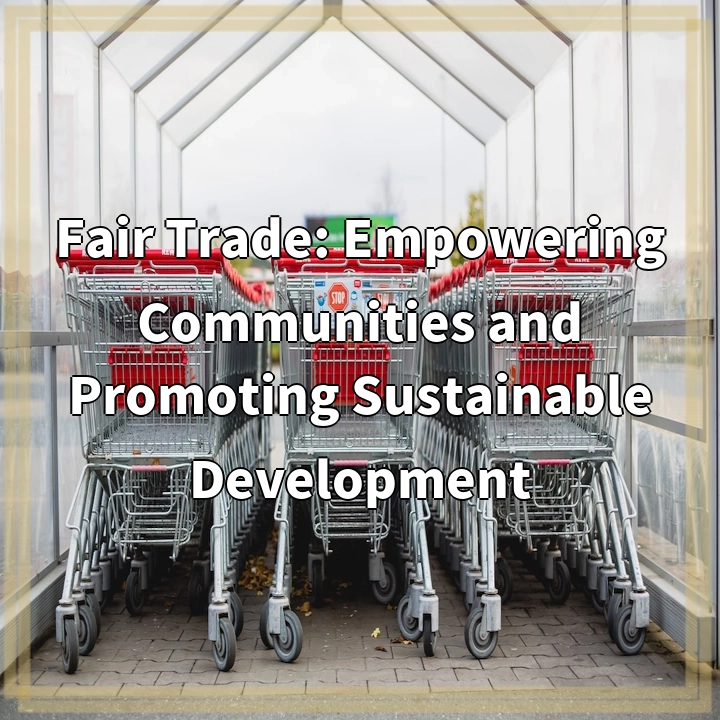
What is Fair Trade?
Fair Trade is a global movement that aims to support and empower marginalized producers and workers in developing countries. It is a system that ensures fair prices, decent working conditions, and sustainable practices for farmers and workers in sectors such as agriculture, handicrafts, and textiles. Fair Trade organizations work directly with producers and facilitate fair trade relationships, ensuring that the products they produce meet specific social, economic, and environmental standards.
Real-World Problems Associated with Fair Trade
While Fair Trade has brought about positive change for many producers and workers, there are still some challenges and limitations to be addressed:
1. Limited Market Access:
One of the main issues faced by Fair Trade producers is limited market access. Despite the growth of Fair Trade products in recent years, they still represent a small percentage of global trade. This limits the potential impact and reach of Fair Trade initiatives in empowering more communities and driving sustainable development.
2. Certification Costs:
The certification process for Fair Trade can be costly, particularly for small-scale producers. The fees associated with obtaining and maintaining Fair Trade certification can create financial barriers for some producers, making it difficult for them to participate in the Fair Trade market or access the premium prices that certified products can command.
3. Global Market Volatility:
The global market for agricultural products, which is where Fair Trade primarily operates, is subject to price fluctuations and other market uncertainties. This can affect the stability and long-term viability of Fair Trade initiatives. It is important to find ways to buffer producers from these market fluctuations and provide them with more stable and predictable incomes.
4. Meeting Consumer Demands:
Fair Trade organizations need to continuously adapt to changing consumer preferences and demands. They must invest in market research and product development to ensure that Fair Trade products meet the quality, design, and functionality expectations of consumers. This can be challenging, especially for small-scale producers who may lack the resources and market insights to keep up with changing trends.
5. Genuine Impact Assessment:
While Fair Trade organizations strive to create positive impact, it can sometimes be difficult to measure and assess the actual outcomes and benefits experienced by producers and workers. More efforts are needed to develop reliable impact assessment methodologies to effectively demonstrate the value and effectiveness of Fair Trade practices.
Fair Trade initiatives play a vital role in empowering communities, promoting sustainable development, and creating a more equitable global economy. Despite the challenges and limitations, the Fair Trade movement continues to evolve and innovate, working towards a future where fair and ethical trading practices are the norm.

Solutions for Fair Trade
Addressing the challenges associated with Fair Trade requires a collaborative effort from various stakeholders. Here are some potential solutions:
1. Improved Market Access:
Efforts should be made to expand the market for Fair Trade products through awareness campaigns, partnerships with retailers, and initiatives to increase consumer demand. This can help create more opportunities for producers and workers to participate in Fair Trade and experience its benefits.
2. Reduced Certification Costs:
Finding ways to decrease the financial burden of certification for small-scale producers is essential. This could involve lowering certification fees, providing financial assistance through grants or subsidies, or exploring alternative certification models that reduce costs while maintaining credibility.
3. Market Stabilization Measures:
Introducing mechanisms to mitigate the impact of global market volatility on Fair Trade producers can provide them with more stability and security. This could include establishing fair pricing mechanisms, creating risk management tools, and developing market access strategies that prioritize long-term partnerships and contracts.
4. Consumer Education and Engagement:
Increasing consumer awareness about Fair Trade and its positive impact is crucial for driving demand. Education campaigns, labeling initiatives, and partnerships with retailers can help inform consumers about the benefits of choosing Fair Trade products, encouraging them to make more conscious purchasing decisions.
5. Robust Impact Evaluation:
Developing comprehensive impact assessment frameworks and tools is essential for understanding and measuring the real-world effects of Fair Trade. This would allow stakeholders to identify areas of improvement, celebrate success stories, and make evidence-based decisions to further enhance the impact of Fair Trade initiatives.
By implementing these solutions, we can overcome the challenges associated with Fair Trade and maximize its potential to empower communities, promote sustainable development, and create a more just and equitable global trade system.















